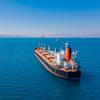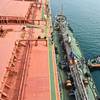Washington State Ferries (WSF)/Washington State Department of Transportation (WSDOT) will shift the entire ferry fleet to low-sulfur diesel fuel, test ultra-low sulfur diesel fuel, and test biodiesel fuel—all steps that will improve air quality by reducing the amount of harmful substances in the ferries’ diesel fuel exhaust.
The ferry system also has upgraded its vessels with more-efficient engines and made operational changes that have reduced fuel consumption and emissions, and will continue seeking new ways to improve fuel efficiency.
As a result of all these changes, nearly 10,000 fewer tons of pollutants will be released into the air by ferry fuel emissions.
The “clean-fuel initiatives” were unveiled at a press conference by Washington Governor Gary Locke, the Director of WSF, the EPA Regional Administrator and officials from utility and air-quality agencies.
Gov. Locke praised WSF/WSDOT for taking steps to reduce air pollution. “Washington citizens value our unique and special ferry system,” he said. “Now we can be even more proud of our ferries because of this innovative program that will improve air quality, benefiting public health and the environment.”
Locke said the ferry system’s clean-air program is in line with his administration’s sustainability initiative and applauded Washington State Ferries for taking leadership in the effort to reduce diesel emissions.
The fact that the ferry system is ahead of the curve on this issue was emphasized by several speakers, including John Iani, Regional Administrator for U.S. Environmental Protection Agency Region 10 (EPA). “The steps being taken by Washington State Ferries are very significant. The ferry system is far ahead of other marine fleet operators in addressing diesel emissions. We hope they will serve as an example to the rest of the nation,” Iani said.
Kim Field, vice chair of the American Lung Association of Washington, said that the association’s State of the Air in Washington 2004 Report identifies diesel emissions as a major problem in the Puget Sound area. Diesel emissions contain fine particles that can become embedded in lungs and cause health problems. Diesel exhaust also contains toxic substances that contribute to environmental problems such as reduced visibility.
Dennis McLerran, director of the Puget Sound Clean Air Agency said, “The good news is that our region leads the nation in converting diesel fleets to cleaner fuels and now the ferry system is expanding this remarkable regional partnership that is serving as a model for other urban areas.”
The entire ferry fleet will begin using low-sulfur diesel fuel this year. This fuel produces fewer fine particles and less sulfur dioxide than the fuel used by the ferries in the past. As a result of the switch, ferries will reduce sulfur dioxide emissions by 412 tons (a 90 percent reduction), and particulate matter by 75 tons (a 30 percent reduction).
Low-sulfur fuel costs less than a penny more per gallon than the fuel the ferries used in the past. Total cost of using the low-sulfur variety will be about $150,000 a year for the entire fleet.
WSF also will conduct a year-long test, starting this summer, of ultra-low-sulfur diesel fuel on the M/V Elwha, which sails from Anacortes through the San Juan Islands. The sulfur content of this fuel ranges from 15 to 30 parts per million, compared to about 350 parts per million in low-sulfur fuel and 3,500 parts per million in the fuel ferries used in the past.
The Clean Air Agency and EPA Region 10 are helping to fund the ultra-low-sulfur diesel test. The test will help the ferry system determine if it is feasible to convert other vessels in the fleet to this cleaner-burning fuel.
A second test, of a biodiesel fuel blend called “B20”, will begin this summer on the “Triangle Route” between Fauntleroy, Southworth and Vashon Island. Biodiesel is a renewable fuel made from virgin or recycled vegetable oils, animal fats, or recycled restaurant greases. It contains almost no sulfur and significantly reduces greenhouse gas emissions. Though more expensive than regular fuel, for the pilot program, WSF will blend 20% biodiesel with 80% low-sulfur petroleum fuel for the test. This mix, called B20, will reduce emissions of particulates and some toxins, and is also less expensive than burning 100% biodiesel.
Seattle City Light Superintendent Jorge Carrasco announced that City Light will fund the additional cost of the biodiesel test as part of its Greenhouse Gas Mitigation Program. City Light will receive the greenhouse gas credits resulting from the use of B20. He explained that the City of Seattle is committed to climate protection and a key component is City Light’s goal to become greenhouse-gas neutral. “We want to help diesel fleets convert to biodiesel, and to build a market for biodiesel that will help bring down its cost,” he explained.
In addition to the fuel change and pilot tests, the ferry system has been buying increasingly fuel-efficient, cleaner-burning engines and equipment for several years.
WSF Director Mike Thorne said the clean-air initiatives are in line with the ferry system’s strategic business plan. In that plan WSF is decreasing costs by five percent, increasing non-fare revenue by five percent, limiting fare increases to 5% per year and committing to improve its business processes, including improving the environmental program.
He pointed to the funding from the EPA and the Clean Air Agency for the ultra-lowsulfur diesel test, and the funding from Seattle City Light for the biodiesel test, as examples of partnerships that benefit the region without increasing costs for ferry riders.
Subscribe for
Maritime Reporter E-News
Maritime Reporter E-News is the maritime industry's largest circulation and most authoritative ENews Service, delivered to your Email five times per week










